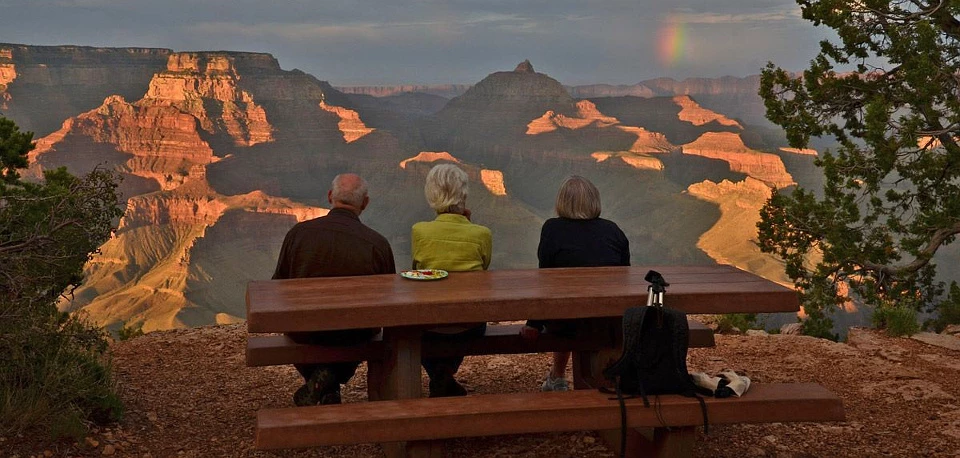
Love of parks can be a lifelong journey or an adventure here for you to discover. If you are a US citizen or resident ages 62 years or older, there are special entrance pass options for you to enjoy your public lands! The America the Beautiful – The National Parks and Federal Recreational Lands Pass Series offers a lifetime and annual Senior Pass option.
Find more information about all options for entrance passes or learn more about the Senior Passes below.
Who is eligible and what are the age requirements for a Senior Pass?
US citizens or residents 62 years or older are eligible for a Senior Pass.
How much does a Senior Pass cost?
The Senior Lifetime Pass is valid for your lifetime and costs $80.
The Senior Annual Pass is valid for one year and costs $20. (The Senior Annual Pass can be upgraded to a Senior Lifetime Pass in-person at a participating federal site that distributes Senior passes.
How can I purchase a Senior Pass?
In Person (Recommended)
Physical passes can be purchased or picked up at over 1,000 federal recreation sites.
Order Online, Receive by Mail
To receive your pass by mail, order online at the USGS Online Store. Online orders are for physical passes, not digital passes, and may take up to three weeks to be processed and delivered. Order receipts may not be used in place of a physical pass. We recommend ordering at least three weeks in advance of your visit, or picking up a pass in person instead.
Get a Digital Pass from Recreation.gov
Skip the wait! Get a Digital America the Beautiful Pass through recreation.gov. Your digital pass can be saved to a mobile device and used immediately.
Get a Digital Senior Lifetime Pass or a Digital Senior Annual Pass.
Where can I use my Senior Pass?
Annual and lifetime Senior Passes provide access to hundreds of recreation sites managed by these six federal agencies:
- National Park Service
- US Fish & Wildlife Service
- Bureau of Land Management
- Bureau of Reclamation
- US Forest Service
- US Army Corps of Engineers
Search this list of entrance fees by park to plan your trip to national park sites.
What are the benefits of my Senior Pass?
The passes cover entrance and standard amenity (day-use) recreation fees and provide discounts on some expanded amenity recreation fees at sites managed by participating federal agencies.
The Senior Passes admit the passholder and passengers in a noncommercial vehicle at per-vehicle fee areas, or up to two motorcycles, or the passholder plus up to three additional adults where per-person fees are charged. Children under 16 are always admitted free. The Senior Passes may also provide the passholder (only) a discount on some expanded amenity fees such as camping, swimming, boat launching, and guided tours.
What if my current Senior Pass is lost or stolen?
Passes are non-refundable, non-transferable, and cannot be replaced if lost or stolen. If lost or stolen, you will have to purchase a new pass.
What if I have an older version of the Senior Pass?
All older versions of the Senior Pass, including the Golden Age Passports, are still valid. We encourage visitors with a Golden Age Passport to exchange it for a new Senior Lifetime Pass for free. Exchanges can be done in person at a park that charges an entrance fee. Remember to bring your Golden Age Passport with you.
Senior Passes Benefiting Your Parks
The legislation states that the cost of the lifetime Senior Pass be equal to the cost of the annual America the Beautiful – The National Parks and Federal Recreational Lands Pass, which is currently $80.
In August 2017, the price of the America the Beautiful – The National Parks and Federal Recreational Lands Senior Pass increased for the first time since 1994. The price increase was the result of the Centennial Legislation P.L. 114-289 passed by the US Congress in December 2016.
The additional revenue is used to enhance the visitor experience in parks.
The legislation established an annual Senior Pass for $20. That pass is valid for one year from the date of issuance. Additionally, access to most National Park Service sites remains free—less than a quarter of more than 400 National Park Service sites have an entrance fee.
Yes, the funds from all Senior Passes purchased in a national park will go to a National Park Foundation Endowment and a National Park Centennial Challenge Fund, both authorized by the Centennial Legislation.
The first $10 million collected by the National Park Service in each fiscal year from Senior Pass sales will be deposited in the Second Century Endowment for the National Park Service managed by the National Park Foundation. The foundation is the congressionally authorized philanthropic partner, or official charity, of the National Park Service. Funds within the Second Century Endowment will be expended on projects and activities approved by the Secretary of Interior to further the mission and purpose of the National Park Service.
All revenues collected from sales by the National Park Service of National Parks and Federal Recreational Lands Senior Passes, that are in excess of $10 million will be deposited in the National Park Centennial Challenge Fund. The funds will be used for projects and programs approved by the Secretary of the Interior to the mission of the National Park Service and to enhance the visitor experience in National Park System units. Projects and programs will require at least a one-to-one match by non-federal donations.
Eighty to one hundred percent of funds from Senior Passes sold by the other five agencies will be retained by the site where they are sold and spent on visitor-related projects and programs.
